In a recent ruling, the Supreme Court addressed a contempt plea against a BJP Member of Parliament (MP), emphasizing the resilience and capacity of the judiciary to handle complex cases involving public figures. The court’s assertion that “our shoulders are broad enough” highlights its readiness to confront challenges posed by powerful individuals, reaffirming the fundamental tenets of justice and accountability. This statement not only underscores the court’s confidence in its role as a guardian of the law but also reflects its commitment to ensuring that no one is above the law, regardless of their political stature or influence.
The contempt plea was brought forth in response to remarks made by the BJP MP that were perceived as undermining the authority of the court. The Supreme Court, in its deliberation, stressed the importance of maintaining the sanctity of judicial proceedings and the need for public officials to respect the judiciary’s role in upholding democracy. The court’s stance serves as a reminder that elected representatives must exercise their speech responsibly, particularly when it pertains to judicial matters. By addressing this issue, the Supreme Court reinforces the principle that the separation of powers is crucial for the functioning of a healthy democracy, wherein each branch of government must operate within its defined limits.
This case also sheds light on the broader implications of political rhetoric and its potential impact on the judiciary. The Supreme Court’s intervention acts as a safeguard against the erosion of judicial authority, particularly in an era where political discourse often blurs the lines between respect for institutions and partisan rhetoric. The ruling sends a clear message that the judiciary will not shy away from addressing contemptuous behavior, regardless of the position held by the individual in question. It emphasizes the necessity for public figures to demonstrate accountability and adhere to the rule of law, thereby fostering a culture of respect for judicial independence.
In conclusion, the Supreme Court’s handling of the contempt plea against the BJP MP serves as a vital affirmation of the judiciary’s strength and impartiality. By asserting that its “shoulders are broad enough,” the court not only defends its jurisdiction but also reinforces the idea that justice must prevail, irrespective of political affiliations. This ruling is a significant step towards upholding the integrity of the judiciary and ensuring that all individuals, regardless of their status, are held accountable for their actions. Ultimately, it is a testament to the enduring principle that the rule of law must be upheld, ensuring a balanced and fair governance system in India.




